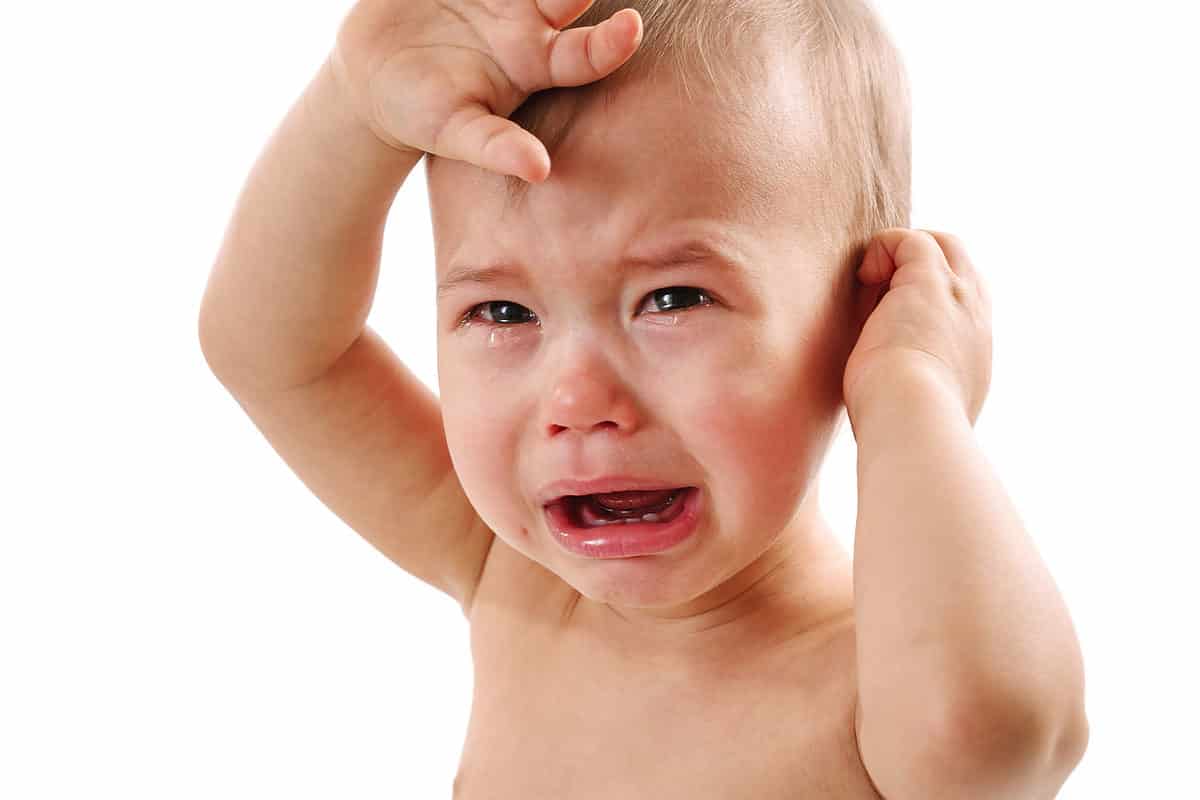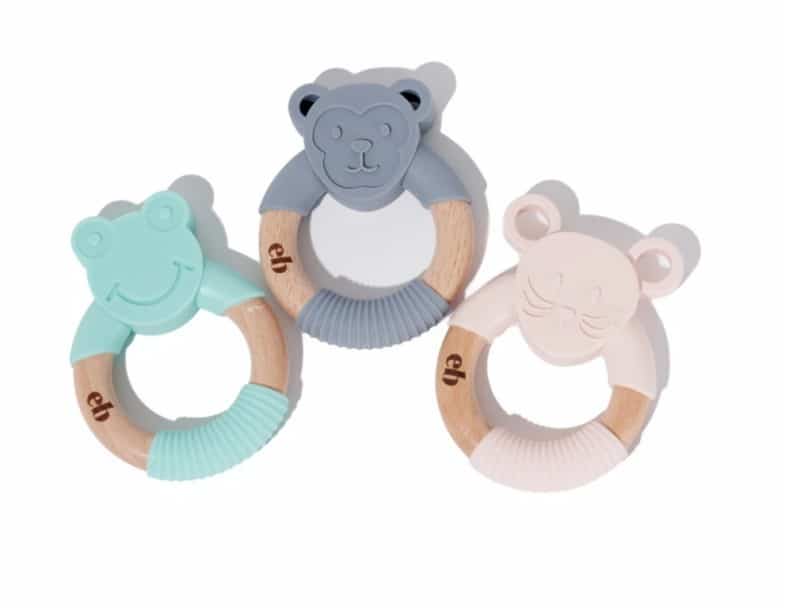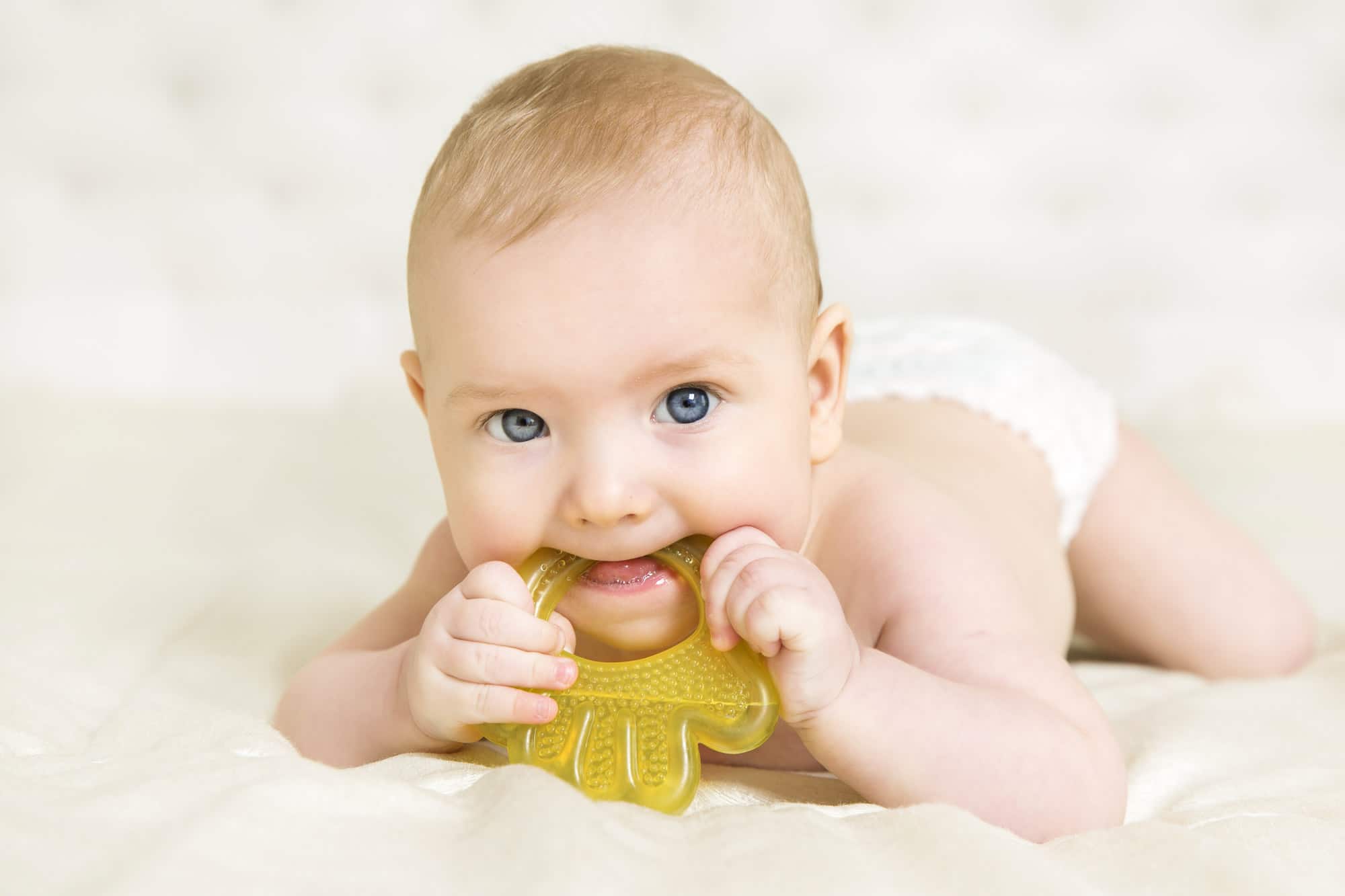As a parent, you are starting to feel comfortable and like you have gotten the hang of it. Your baby has a feeding schedule. You understand their different cries, you can change a diaper in record time, and you may even have mastered the skill of sleeping when the baby sleeps. Then all of a sudden, your baby changes, and this little human you thought you knew is up at night crying and fussing, and no amount of silly faces and soft kisses distracts them. Well, you are entering the teething stage of babyhood.
The teething stage is difficult for babies and tired parents. When the baby is uncomfortable, the whole household is uncomfortable. But there are ways to soothe a teething baby at night, so everyone can get some sleep.
Key Points
- A baby will usually begin teething between four and seven months.
- A baby's teeth won't all come in at once, so they will get some respite between each bout of teething.
- A baby who is suddenly irritable, drooling and moving their mouth a lot, or who has swollen gums is beginning to teeth.
What Is Teething?
Teething is when an infant’s teeth start to break through the gums. It is painful for the infant, and they will be irritable, fussy, and generally not themselves.
When Does Teething Start?

Teething babies like to chew and gnaw on things like soft toothbrushes.
©gpointstudio/Shutterstock.com
According to Kids Health, babies start teething between 4 and 7 months. But there are cases where babies are actually born with teeth or start cutting teeth at just a couple of months old. There are other cases of babies reaching their first birthdays without any teeth at all. Generally speaking, though, most babies start closer to 6 months. Usually, the first two teeth to come in are the bottom. Several weeks later, the top two. Luckily babies' teeth don't come in all at once, so there is some relief for them between each bout of teething.
Generally, by the time your little one reaches 3 years old, they will have all of their baby teeth.
Signs Your Baby Is Teething

Teething babies will gnaw on their fists and drool.
©Troyan/Shutterstock.com
As a parent, nobody knows your baby better than you. You know what normal behavior for your baby is and when they are acting differently. Before you start using teething remedies first, you want to determine that they really are teething. It's not something different, like an ear infection, common cold, or just a bad day which babies can have too.
Ear infections are commonly mistaken for teething because babies will often pull at their ears when they have an ear infection or are teething. The teething pain is caused by nerves that are connected to the middle part of the ear, so the baby will feel like the pain is coming from the ear. Teething may cause a slight fever, but according to a study in Pediatrics, a fever over 100.4, which they refer to as a “true fever,” is not associated with teething. A fever of over 100.4 is connected to ear infections or other illnesses. Ear infections are common, and possible signs include diaper rash, diarrhea, or vomiting.
Teething symptoms may come and go and are always worse at night when the baby isn’t distracted. The pain and discomfort affect their appetite and their much-needed sleep. The most common signs of teething include:
- Unexplained irritability
- Mimicking chewing
- Drooling and possible drooling rash
- Swollen or irritated gums
3 Steps to Soothe a Teething Baby

Teething babies will tug on their ears.
©iStock.com/Jun
You have determined that your baby is teething, so now what? The best way to help your baby through this difficult time is to be prepared and stay calm. Using a soft voice in a dimly lit room while applying these strategies is the best way to help your baby. For some babies, a white noise machine or soft music helps distract from the soreness. Combined with these three steps, your baby will be back to sleep quickly.
1. Use Cold to Numb the Gums
The first step to soothe a teething baby is the easiest: use cold to numb the pain. An overtired, teething baby will have sore gums, and applying cold directly to the gums is an effective option. The best way to do this is with teething toys or rings that babies can gnaw on for some relief. These toys are meant to be cold, but according to Healthline, they should be kept in the cold refrigerator rather than the freezer because hard frozen toys can damage the baby’s gums.
Before using teething rings, check that they are not broken or damaged. Babies chewing and gnawing on them can wear these toys out. Always inspect them for missing bits where the liquid insides could ooze out, or choose solid plastic toys for extra precaution. Replace them as needed.
Another option on the market is teething jewelry. Keep in mind, though, that the Food and Drug Administration recommends avoiding teething jewelry like necklaces and bracelets because they are a choking and strangulation hazard.
2. Put Pressure on the Gums
The second step recommended by pediatricians to soothe a teething baby is to use pressure to alleviate the pain. Try placing a clean finger in your baby's mouth and using light pressure to massage their gums to help them find some relief. This is especially effective during the bedtime routine as they are winding down or if they wake up in the middle of the night with pain. The pressure on their teeth in connection with being held and comforted is an excellent way to bond with your baby.
Keep in mind if you have cooked a meal earlier in the evening with onions, garlic, or hot peppers, your finger may still have some residue that will cause more discomfort to your already upset infant. Wash your hands thoroughly. In the case of hot peppers, be extra careful because the oil can stay on the skin even after multiple hand washings.
3. Consider Using Over the Counter Medications
The third step is to talk to your pediatrician. If your baby is having excessive discomfort and it's affecting their sleep repeatedly, you can talk to your pediatrician about using acetaminophen. Typically, this is only an option for babies that are at least 6 months of age. Infant Tylenol or infant ibuprofen can help the baby with the discomfort and finally fall asleep. But only your pediatrician can determine if that is a viable option and advise the proper dosage. Think of over-the-counter medication as a last resort and try other options first. Also, never give a child aspirin because it is connected to Reye's syndrome, which is a rare but serious disease.
There are topical teething gels and ointments available, but they are not effective. Numbing gels are quickly washed away by excess drool. In addition, the FDA recommends avoiding any topical gels, whether over-the-counter or prescribed.
Pro Tips

Teething rings are excellent for teething babies.
- Always wipe any excess drool from the baby’s face. Drool causes a rash and adds even more discomfort to their sensitive skin.
- Invest in several cold teething toys so you can switch them out for a new colder one throughout the night.
- If you find yourself without a teething toy, you can use a clean wet washcloth that has been in the refrigerator instead. Make sure there aren’t any loose threads and let your baby gnaw on that for some relief.
- Experts recommend sticking to your baby’s sleep schedule, and if you haven't implemented one yet, it is a good idea to set a sleep schedule and bedtime routine so everyone in the house can get some sleep.
The teething stage is a trying time, and the best way to get through it is to ensure your baby is comforted and given the opportunity to cut their teeth in a safe, loving environment.
While your baby is enduring physical changes and essentially their first growing pains, the time is mentally exhausting for parents who are already sleep deprived. Having a support system in place with friends and family that can watch the baby and give you a break is important to keeping yourself healthy. Don't underestimate the power of even a short nap to restore and rejuvenate. And remember, babies won't be teething forever. Like every difficult developmental stage, it will end.
When Should I Be Concerned About My Baby's Teething?
If your baby's gums begin to bleed or you notice any pus, take them to a pediatric dentist right away. Your baby's gums may be swollen, but their entire face should not be swollen.
Diarrhea, vomiting, fever, cough, or congestion are not normal symptoms of teething and warrant a visit to your pediatrician. If your baby seems to be in especially bad pain during teething, it might warrant a visit to a pediatric dentist.
Generally, teething is a straightforward process and the worst your baby will experience is some discomfort. It's still important, however, to monitor them for any possible issues!
The image featured at the top of this post is ©inarik/ via Getty Images
